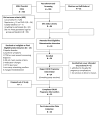CALM Pregnancy: results of a pilot study of mindfulness-based cognitive therapy for perinatal anxiety
- PMID: 24449191
- PMCID: PMC4107206
- DOI: 10.1007/s00737-013-0402-7
CALM Pregnancy: results of a pilot study of mindfulness-based cognitive therapy for perinatal anxiety
Abstract
Many women experience anxiety during pregnancy with potential negative effects on maternal, birth, and child outcomes. Because of potential risks of fetal exposure to psychotropic medications, efficacious non-pharmacologic approaches are urgently needed. However, no published studies of psychotherapeutic treatments for anxiety in pregnancy exist. Mindfulness-based cognitive therapy (MBCT) may substantially reduce anxiety and co-morbid symptoms in people with anxiety disorders. Coping with Anxiety through Living Mindfully (CALM) Pregnancy is an adaptation of MBCT designed to address anxiety in pregnant women. This study examined the feasibility, acceptability, and clinical outcomes of the CALM Pregnancy intervention in pregnant women anxiety. Twenty-four pregnant women with generalized anxiety disorder (GAD) or prominent symptoms of generalized anxiety participated in an open treatment trial of the CALM Pregnancy group intervention. Psychiatric diagnoses were determined by structured clinical interview, and self-report measures of anxiety, worry, depression, self-compassion, and mindfulness were completed at baseline and post-intervention. Qualitative feedback was elicited via questionnaire. Twenty-three participants completed the intervention with high attendance and good compliance with home practice. Completers showed statistically and clinically significant improvements in anxiety, worry, and depression, and significant increases in self-compassion and mindfulness. Of the 17 participants who met GAD criteria at baseline, only one continued to meet criteria post-intervention. Participants regarded their experience in the intervention to be overwhelmingly positive. MBCT in the form of the CALM Pregnancy intervention holds potential to provide effective, non-pharmacological treatment for pregnant women with anxiety. These promising findings warrant further testing of the intervention with a randomized controlled trial.
Figures
References
-
- Adewuya AO, Ola BA, Aloba OO, Mapayi BM. Anxiety disorders among Nigerian women in late pregnancy: a controlled study. Arch Women Ment Health. 2006;9:325–8. - PubMed
-
- Alder J, Fink N, Bitzer J, Hosli I, Holzgreve W. Depression and anxiety during pregnancy: a risk factor for obstetric, fetal and neonatal outcome? A critical review of the literature. J Matern Fetal Neonatal Med. 2007;20:189–209. - PubMed
-
- Alvik A, Heyerdahl S, Haldorsen T, Lindemann R. Alcohol use before and during pregnancy: a population-based study. Acta Obstet Gynecol Scand. 2006;85:1292–8. - PubMed
-
- American Psychiatric Association. Diagnostic and Statistical Manual of Mental Disorders. 4. American Psychiatric Publishing; Washington, DC: 2004. text rev.
-
- Andersson L, Sundstrom-Poromaa I, Wulff M, Astrom M, Bixo M. Depression and anxiety during pregnancy and six months postpartum: a follow-up study. Acta Obstetricia et Gynecologica. 2006;85:937–44. - PubMed
Publication types
MeSH terms
Grants and funding
LinkOut - more resources
Full Text Sources
Other Literature Sources
Medical
Miscellaneous


